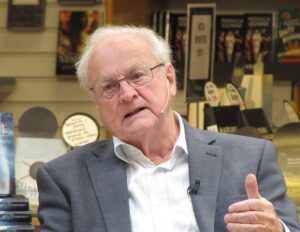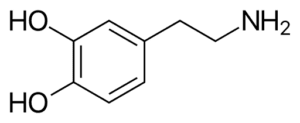 |
| Arvid Carlsson, 2011. Photo by Volger on Wikimedia. CC BY-SA 3.0. |
In the world of science, the name of the Swedish physician scientist Arvid Carlsson is inextricably linked to that of dopamine. This catecholamine, consisting essentially of a benzene ring linked to an amine, was isolated as early as 1910, but had been largely ignored as being a mere precursor of epinephrine and norepinephrine from tyrosine. Through the work of Carlsson, it became the major player in the pathogenesis and therapy of Parkinson’s disease.
Arvid Carlsson was born into a middle-class family in Uppsala in 1923. He began to study medicine at the University of Lund in 1941 but his studies were interrupted by having to serve several years in the Swedish Armed Forces. In his autobiography he reminisced how in 1944, while still a medical student, he participated in the task of examining former prisoners of Nazi concentration camps, whom the Swedish aristocrat Folke Bernadotte had brought to Sweden.1 He found that many were undernourished, suffering from tuberculosis, and having severe mental anguish and suspiciousness induced by their dreadful incarceration.2
 |
| Skeletal formula of dopamine. Via Wikimedia. |
After graduation in 1951 Carlsson opted to go into research. He worked as a research assistant (at first unpaid) at the University of Lund on the effects of several chemicals on the brain and on calcium metabolism and vitamin D.2 In 1955 he spent five months at the US National Institutes of Health in Bethesda and became interested in neurotransmitters and specifically in dopamine.
Back in Lund he pursued further studies on dopamine. In 1957 he used a sophisticated version of the techniques he had learned in the United States to study the distribution of dopamine in the brain. He found that the concentration of dopamine was highest in the basal ganglia of normal subjects but very low in patients with Parkinson’s disease. This led to experiments in which he followed through by showing that that an injection of dopamine could reverse the Parkinsonian like effects induced by reserpine. These findings established that Parkinson’s disease was caused by a lack of dopamine in the basal ganglia, also that dopamine was a crucial transmitter of signals across the synapses in the brain. This eventually resulted in the development of effective antiparkinsonian drugs.3-5
In 1959 Carlsson moved to the University of Gothenburg as Professor of Pharmacology. He remained there for the rest of his career, becoming emeritus in 1989. He showed that the widely used antihypertensive agent reserpine depleted the brain of dopamine, furthering a better understanding of the role of the brain in hypertension. His work also paved the way for the discovery of fluoxetine or Prozac and of the understanding of the role of dopamine in the causation of the extrapyramidal side-effects of antipsychotic medications.
In 2000 Carlsson was awarded the Nobel Prize in Physiology or Medicine for his work on neurotransmitters. He mentored many students and researchers and was a key figure in establishing the Sahlgrenska Academy at the University of Gothenburg. He was a vocal critic of the use of drugs in sport and a supporter of the anti-nuclear movement. He was also involved in the establishment of the Swedish Society for Medical Ethics. He died in 2018 at the age of 95, remembered as a great scientist and humanitarian.
Further reading
- Arvid Carlsson. Wikipedia. https://en.wikipedia.org/wiki/Arvid_Carlsson.
- Carlsson A. Biographical. The Nobel Prize. https://www.nobelprize.org/prizes/medicine/2000/carlsson/biographical/.
- Yeragani VK, Tancer M, Chokka P and Baker GB. Arvid Carlsson, and the story of dopamine. Indian J Psychiatry 2010;52:87.
- Glenthøj B and Fibiger HC. In Memoriam: Arvid Carlsson—Pioneering Researcher and Nobel Laureate. Neuropsychopharmacology 2019;44:457.
- Watts G. Arvid Carlsson. Lancet Aug 25, 2018;392:630.
GEORGE DUNEA, MD, Editor-in-Chief
Spring 2023 | Sections | Physicians of Note

Leave a Reply